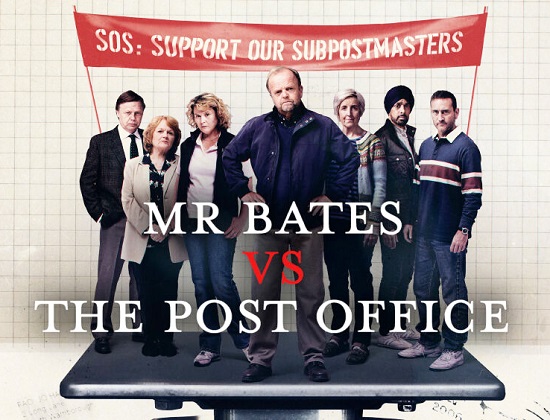REVIEW
UK ITV, broadcast 1-4 January 2024
The arc of the moral universe is long, but it bends toward justice, said Martin Luther King. For the UK sub-postmasters featured in Mr Bates vs the Post Office, that arc was more than 20 years, but they are finally achieving justice, thanks to the impact of this extraordinary miniseries.
The series, starring Toby Jones as the indefatigable Welshman Alan Bates, dramatises the travails of the hundreds of individual post office operators in the UK, called sub-postmasters, who were falsely prosecuted by UK Post Office and the government for false accounting, theft and fraud, between 1999 and 2015. The opening scene shows Alan Bates’ essential character, which was his stubbornness in refusing to accept that he was to blame for daily shortfalls in the accounting of his post office. Unlike many other sub-postmasters, who doubted themselves and were later manipulated into plea bargains, Bates was absolutely certain the problem lay with the new accounting system that the Post Office had started rolling out in 1999, called Horizon, designed by the UK subsidiary of Japanese tech giant Fujitsu. Sub-postmasters were contractually obligated to make up the daily shortfalls from their own pockets, but because Bates refused to accept he was at fault, UK Post Office management took away his post office, but they didn’t charge him. Hundreds of others, as the drama shows, were not so lucky, but Bates’ experience made him even more certain he was in the right, and so he was able to lead the more than 20-year fightback against UK Post Office, and organise the victims into a fighting force, which finally succeeded in clearing their names.
The experiences of many other sub-postmasters, dramatised in the series, was truly shocking. These are people straight out of an English postcard of a quaint village with the butcher, baker, and postmaster; the salt of the earth, not sophisticated or devious financial predators—unlike the corporate management of UK Post Office. Many were prosecuted despite UK Post Office knowing they were innocent; a number committed suicide or attempted suicide, including one young mother who almost lost her mind from the sheer stress, confusion, and humiliation of being reported on the front page of the newspapers as being charged with theft; one man who did fight the accusation his post office was £25,000 short represented himself in court, only for the judge to rule against him and award costs to UK Post Office, leaving him with a bill of more than £300,000! More than 400 of these people who were pillars of their local communities were jailed, but only a handful of people in Parliament asked questions.
Amazingly, the people running UK Post Office who perpetrated what is being called “the widest miscarriage of justice in British history” were not evil schemers, cackling and rubbing their hands with glee over each new victim, as the mind might conjure. They were simply corporate hacks, loyal to corporate group-think, the profit motive and the personal incentive of bonuses, that is inflexible towards its victims and people in the real world generally. The CEO, Paula Vennells, was and is a high-ranking priest in the Church of England! The series shows that despite knowing the suffering of their victims, these corporate hacks could not admit any culpability by the company, but, advised by lawyers, had to defend the “reputation” of UK Post Office, and their own reputations, even if it meant lying, blocking investigations, and covering up evidence, knowingly causing more innocent people to be falsely prosecuted and jailed.
It’s challenging to capture more than 20 years of this fight in just four 45-minute episodes, but the producers managed to capture the essence of the conflict, and the key turning points. These include when Alan Bates got in touch with other victims, and started to lead the fightback; when one Tory MP used his influence to persuade UK Post Office to fund an independent investigation by a forensic accountant, who was astounded at what he found and became a fierce advocate for the sub-postmasters; when a Fujitsu whistleblower came forward to confirm that Fujitsu and UK Post Office knew their Horizon product was faulty; and eventually when a top lawyer contacted Alan Bates to organise a funded class action, which in 2019 ruled for the sub-postmasters, describing the convictions against them as an “affront to justice”.
Subsequent court cases overturned the convictions of more than 90 sub-postmasters, but the final turning point has been the airing of this drama on ITV in the UK at the beginning of January. It has rocked British politics, and suddenly all the politicians in Westminster are scrambling to address the issue. The government has promised to overturn all of the convictions, and provide real compensation for the victims, in the form of a £1 billion pound fund from which more than 4,000 sub-postmasters are entitled to various levels of compensation.
Mr Bates vs the Post Office, achieves what great drama has always aspired to achieve—a real-world impact drawn from the moral clarity of the audience. There is nothing especially noteworthy in the way the drama is presented, except that it sticks closely with the truth, from which comes the power in this extraordinary story. For having the courage to present the truth, everybody involved in the production of this drama deserves kudos, beside the pride they must all be feeling from being involved in such an impactful miniseries. See also—Urgent: Australian Parliament must apply lessons from UK post office scandal to save Australia Post and licensees, p. 3.
Mr Bates vs the Post Office can be watched online at https://www.itv.com/watch/mr-bates-vs-the-postoffice/10a0469, but it requires a VPN to watch from outside the UK.
By Robert Barwick, Australian Alert Service, 24 January 2024







